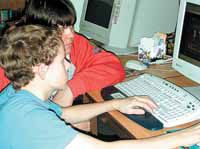| Sean Sanchez and Rick Berg surf the Internet at the Price City Library. It has become a priority for parents and adult guardians to protect children from obscene material which may cross over the electronic highway and onto a personal or public computer screen. At public places like the library and in homes where Internet use is popular among children, adults should keep a watchful eye on the images and content of the material that comes across the computer screens. Any controversial material should be noted and reported immediately to the Internet service provider or the National Center for Missing and Exploited Children. |
The Internet is becoming a major link to information and communication for the members of society. Carbon County is no exception.
Today, children throughout the world are connected to the Internet, both as an educational tool and also as a pastime.
The trouble that faces children today, however, is the information or material which may appear on the computer screen while a child is surfing the net. It has become a known fact that the Internet is a useful, yet dangerous tool for children.
As a parent or guardian, Carbon County adults are concerned about local children’s safety. It has become a responsibility for child providers to keep a watchful eye on the material which comes across the information highway.
In order to keep track of material which children view on the Internet, experts suggest that the computer be placed in a central location such as the kitchen or family room. This way, everyone in the family has access to it and parents may also keep a watchful eye on material which children view while using the electronic device.
Often times, children will use the computer while parents are not around. This is fine, but make sure to discuss proper usage as well as set reasonable rules for computer use. This will make children aware of what is considered acceptable to view and what is not.
The best way to ensure that a child does not find themselves in an uncontrollable situation such as becoming a victim of computer fraud or harassment, is to teach the child that it is not acceptable to give out any personal information such as a name and address.
Rather, parents should explain the dangers to children and allow them to provide this information only after parental approval is given.
Chat rooms have become a common place for child predators to stock their prey. Once a computer user enters a chat room, their real identity can quickly become something that it is not.
In fact, the 12-year-old girl may be chatting with a 40-year-old man pretending to be a 13-year-old in anattempt to obtain personal information which may lead to a serious physical confrontation.
Many times, arrangements will be made over the Internet for two chat room friends to meet. This is becoming quite a common occurrence and it continues to become more and more dangerous.
If arrangements are made to meet in person, parents should be nervous. After all, not everything on the Internet is a fact and if it sounds too good to be true, it probably is.
Encounters can put anyone at risk of being seriously injured or harmed. Therefore, it is extremely important to never give out a physical address. This makes a possible victim of a crime easily accessible.
Parents tend to worry more about arranged meetings than any other risk which the Internet poses. Although this is a legitimate worry, parents should also be aware of the obscene or provocative material that comes across the computer screen at the click of a mouse.
Even if an Internet user is not looking for this type of material, too often bulletin board or messages appear without warning. It is best that these messages or bulletin boards are not answered or responded to.
Parents should encourage their children to make them aware of this type of material when it appears on the computer screen.
If a child receives a message that is harassing, of a sexual nature or threatening, forward a copy of the message to the Internet provider and ask for further assistance on how to eliminate this material from coming across the electronic highway.
The vast majority of Internet sites are safe. However, the virtual world contains some sites which contain sexual, violent and other contents that may not be appropriate for younger children and teenagers.
Since different families have different standards, it is important to establish clear guidelines for each child’s Internet use.
Some home computers and many different software programs claim to eliminate this material from crossing the electronic highway and entering into one’s home.
Even if these types of programs claim to filter 100 percent of the provocative material which transfers over the Internet, parents should still exercise caution and monitor youth.
State and national child protection experts stress the fact that the type of software in question is no substitute for parental involvement.
Finally, adults are advised to become aware of the transmission, use or viewing of child pornography while online.
If any of the situations ahould occur, Carbon County residents should immediately report the information to the National Center for Missing and Exploited Children at 800-843-5678.
As community members, Carbon County residents can make the Internet a safe and educational tool for children to use on a regular basis.

